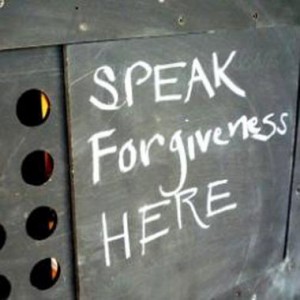Wave-Mechanical Aspects of Forgiveness
STATIONS TWO, an interactive public artwork gathering the COLLECTIVE VOICE OF HUMAN FORGIVENESS
What we fear about forgiveness – why it’s tragically so difficult – is that there’s loss involved. We speak of injury as “sustained”. And it is. It tends, in a sort of compensatory way, to come to belong to us – define us, even, sometimes. In forgiving we risk losing that as if our own diminishment were something to possess. It’s ours, we think. And in some terrible cases may seem like it’s all that’s left. The injury then, perversely, feels like a positive thing. Forgiveness like a negative – an uncertainty at best. Yet once permitted, we suggest, this fearful change of state discovers something like a natural resonance, a propagating quality.
These panels – scrawled with the evidence from the 2007 opening of the Desmond Tutu Center in New York, from other cities in the U.S. and in Ireland where they traveled, as the interactive project Stations One*, with the play Truth in Translation – gathered expressions of, or longings toward, forgiveness, people speaking into the openings there like talking to a prisoner or a priest on the other side, but actually speaking into a sort of conceptual hollow like a seashell which, as you know, placed to the ear sounds like the ocean. It’s the oceanic aspect that we’re after – why these voices, as they echoed through and mingled with each other, were recorded onto documented flashdrives to be further mixed, at some point, to discover what the overall effect might be, as the overall effect of condensation might be rain or, finally, surf.
A second project, Stations Two – more explicitly a hollow, a container – was a six-foot black recycled plastic cube which went to Rwanda. Little windows in the sides received the voices which could then be heard delayed, repeated, mixed into the general wash of sound inside as it was being recorded.
Here, in the gallery, the black room is as if inside the cube, or maybe the shell. The radiating panels – like the plates of a storage battery – are to speak forgiveness into: to receive, as well, the ambient noise, the occasional joke or insult, gather it all into the dark where something like a natural process may be sensed, if not exactly understood.
It is the wash of the idea we want to capture. When you listen to the shell and hear the ocean, what does it say? It’s like a sigh, of course, but not the kind of sigh that’s going slack, that’s giving up. That’s not what waves say. They say nothing is ever lost. That everything goes on. That we are here and we forgive and we go on as well.
*Stations One was funded by a grant from the Embrey Foundation through the nonprofit Today Marks the Beginning. It was conceived and created by the team of Tim Coursey, James Neel, Nancy Rebal and David Searcy. In 2007 and 2008 it traveled with Michael Lessac’s play Truth in Translation which tells the story of the interpreters at South Africa’s Truth and Reconciliation Commission.